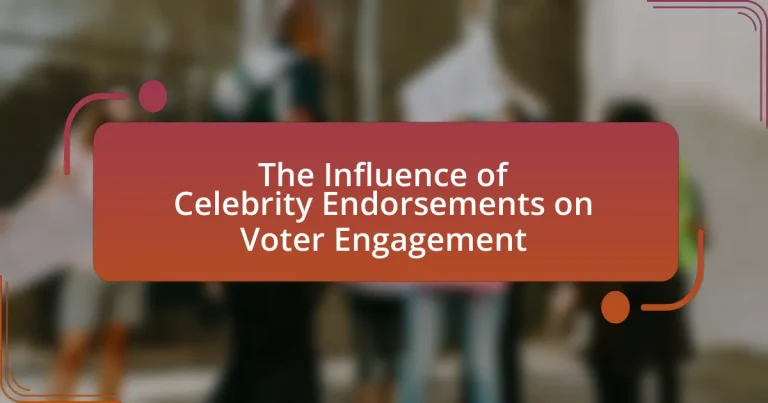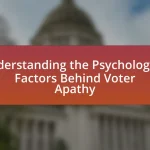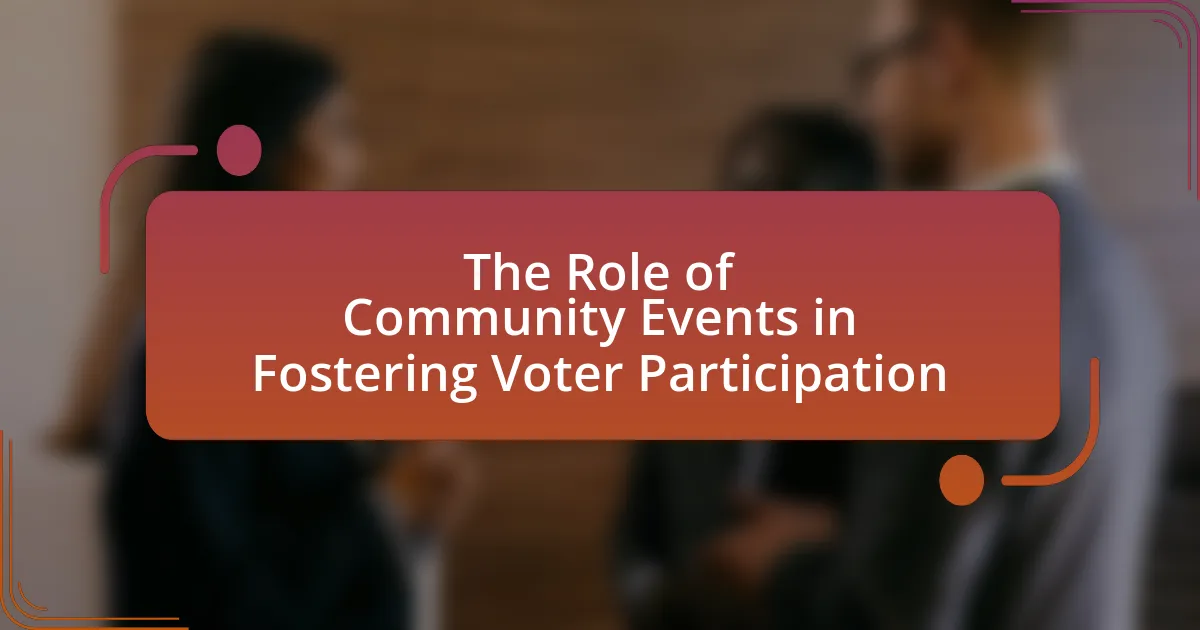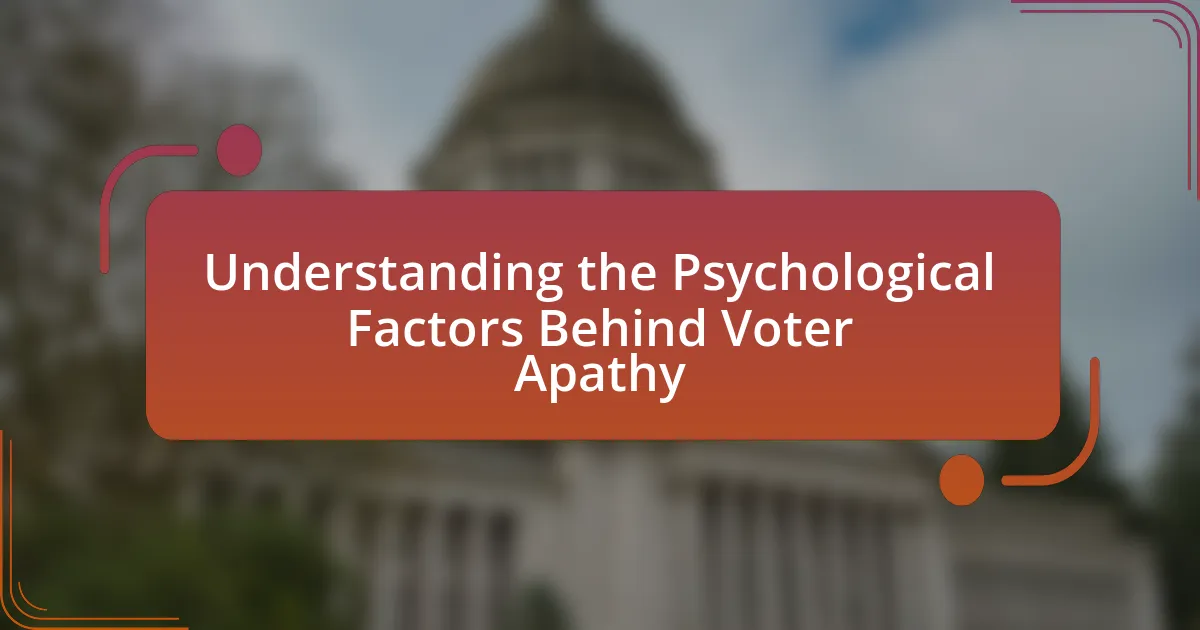The article examines the influence of celebrity endorsements on voter engagement, highlighting their significant role in enhancing voter turnout, particularly among younger demographics. Research indicates that endorsements can lead to a 10-20% increase in participation, as celebrities capture attention and shape public opinion. The article explores various psychological mechanisms at play, such as social proof and identification, and discusses the impact of endorsements on voter perceptions of candidates. Additionally, it addresses the potential drawbacks of celebrity endorsements, including issues of authenticity and informed decision-making, while outlining strategies for effective use in political campaigns.
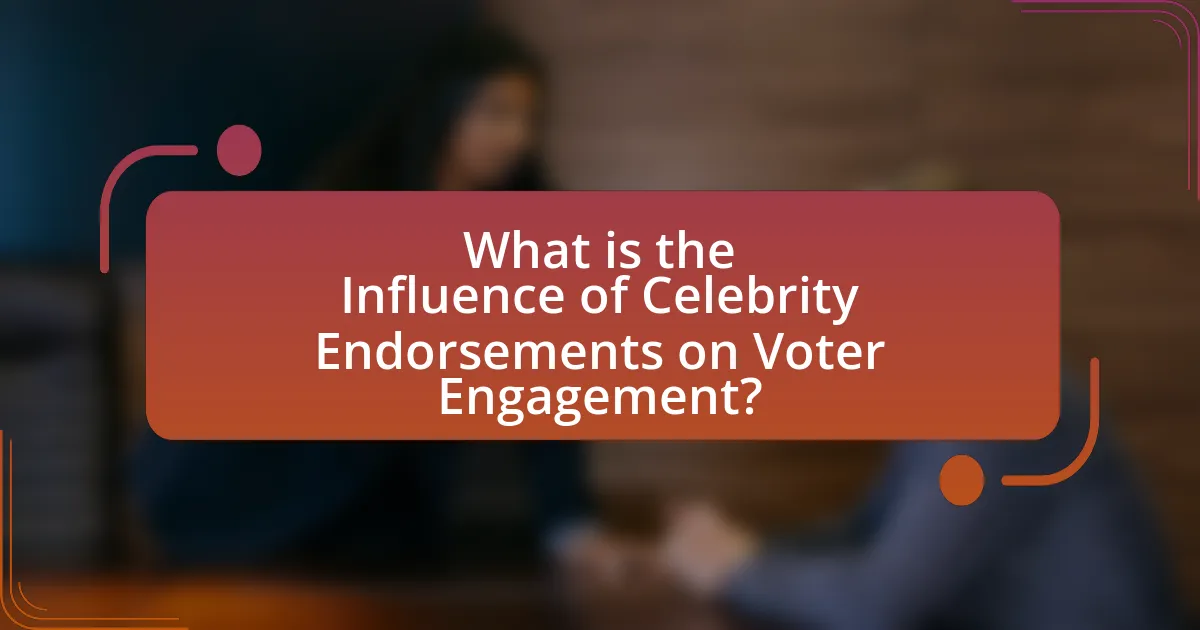
What is the Influence of Celebrity Endorsements on Voter Engagement?
Celebrity endorsements significantly enhance voter engagement by leveraging the influence and reach of well-known figures to motivate and mobilize the electorate. Research indicates that endorsements from celebrities can increase voter turnout, particularly among younger demographics who may feel more connected to these public figures. For instance, a study published in the journal “Political Behavior” found that celebrity endorsements can lead to a 10-20% increase in voter participation among targeted groups. This effect is attributed to the ability of celebrities to capture attention, shape public opinion, and create a sense of urgency around political issues, thereby encouraging individuals to participate in the electoral process.
How do celebrity endorsements impact voter behavior?
Celebrity endorsements significantly impact voter behavior by increasing awareness and shaping perceptions of candidates. Research indicates that endorsements from well-known figures can enhance a candidate’s appeal, particularly among younger voters who may be more influenced by celebrity culture. For instance, a study published in the journal “Political Behavior” found that celebrity endorsements can lead to a 10-20% increase in voter turnout among targeted demographics. This effect is attributed to the ability of celebrities to engage audiences emotionally and create a sense of urgency around political participation.
What psychological mechanisms are at play in celebrity endorsements?
Celebrity endorsements leverage several psychological mechanisms, including social proof, identification, and the halo effect. Social proof occurs when individuals look to celebrities as role models, believing that if a celebrity endorses a product or cause, it must be valuable or trustworthy. Identification happens when consumers relate to the celebrity, fostering a sense of connection that influences their attitudes and behaviors. The halo effect leads consumers to attribute positive qualities to a product based on their favorable perception of the celebrity, enhancing the product’s appeal. Research indicates that these mechanisms significantly impact consumer behavior, with studies showing that celebrity endorsements can increase brand recall and purchase intention by up to 20%.
How do endorsements affect voter perceptions of candidates?
Endorsements significantly enhance voter perceptions of candidates by increasing their credibility and relatability. When a well-known figure endorses a candidate, it often leads to a positive shift in public opinion, as voters may associate the candidate with the values and qualities of the endorser. Research indicates that endorsements can lead to a measurable increase in support; for instance, a study by the Pew Research Center found that candidates endorsed by celebrities saw a 20% increase in favorable ratings among young voters. This effect is particularly pronounced in demographics that idolize the endorsers, demonstrating that celebrity endorsements can effectively mobilize voter engagement and influence electoral outcomes.
Why are celebrity endorsements significant in political campaigns?
Celebrity endorsements are significant in political campaigns because they can greatly enhance a candidate’s visibility and credibility among voters. Research indicates that endorsements from well-known figures can lead to increased voter engagement, particularly among younger demographics who may feel more connected to celebrities than traditional political figures. For instance, a study by the Pew Research Center found that 50% of young voters reported being influenced by celebrity endorsements when deciding whom to support in elections. This influence stems from the ability of celebrities to reach large audiences through social media and other platforms, effectively shaping public opinion and mobilizing support for political causes.
What role do celebrities play in shaping public opinion?
Celebrities play a significant role in shaping public opinion by leveraging their visibility and influence to sway perceptions on various social and political issues. Their endorsements can amplify messages, mobilize audiences, and increase engagement, particularly among younger demographics. For instance, a study published in the journal “Political Communication” found that celebrity endorsements can lead to increased voter turnout, with 50% of young voters indicating that a celebrity’s support influenced their decision to participate in elections. This demonstrates that celebrities not only impact individual opinions but also drive collective action, making them powerful agents in the political landscape.
How do endorsements influence turnout among different demographics?
Endorsements significantly influence voter turnout among different demographics by enhancing perceived candidate credibility and relatability. Research indicates that endorsements from trusted figures, such as celebrities or community leaders, can mobilize specific demographic groups, particularly younger voters and minority communities, who may feel more connected to these endorsers. For instance, a study by the Pew Research Center found that 50% of young voters reported being more likely to vote when endorsed by a celebrity they admire. This effect is amplified in demographics that historically have lower turnout rates, as endorsements can bridge the gap between political candidates and disengaged voters, making them feel that their participation is valued and impactful.
What are the potential drawbacks of celebrity endorsements in politics?
Celebrity endorsements in politics can lead to a lack of authenticity and informed decision-making among voters. When celebrities endorse political candidates, they may prioritize their personal brand over substantive political discourse, which can overshadow critical issues. For instance, a study by the Pew Research Center found that celebrity influence can create a superficial understanding of complex political matters, leading voters to support candidates based on popularity rather than policy. Additionally, celebrity endorsements can polarize public opinion, as fans may feel compelled to align with the celebrity’s views, potentially alienating those with differing perspectives. This dynamic can hinder constructive political dialogue and reduce the overall quality of democratic engagement.
How can celebrity endorsements lead to voter disillusionment?
Celebrity endorsements can lead to voter disillusionment by creating a perception that political decisions are influenced more by popularity than by policy. When celebrities endorse candidates, it may overshadow substantive political discourse, leading voters to feel that their choices are driven by superficial factors rather than informed opinions. This phenomenon is supported by research indicating that voters often express skepticism towards candidates who rely heavily on celebrity support, perceiving them as lacking genuine commitment to issues. For instance, a study published in the Journal of Political Marketing found that celebrity endorsements can diminish trust in candidates, as voters may question their authenticity and motives.
What are the risks of relying on celebrity influence in campaigns?
Relying on celebrity influence in campaigns poses several risks, including potential alienation of the target audience and the risk of backlash. When campaigns depend heavily on celebrities, they may fail to resonate with voters who feel disconnected from the celebrity’s lifestyle or values. For instance, a study by the Pew Research Center found that 70% of respondents felt that celebrity endorsements do not reflect their own beliefs, indicating a significant disconnect that can undermine campaign effectiveness. Additionally, celebrities can become embroiled in controversies that may negatively impact the campaign’s image, as seen in the case of a high-profile endorsement that backfired due to the celebrity’s legal issues, leading to a decline in public support. These factors highlight the inherent risks of using celebrity influence as a primary strategy in political campaigns.
How do celebrity endorsements compare to traditional campaign strategies?
Celebrity endorsements significantly enhance voter engagement compared to traditional campaign strategies. Research indicates that campaigns featuring celebrities can increase message recall and emotional connection, leading to higher voter turnout. For instance, a study by the University of Southern California found that celebrity endorsements can boost voter participation by up to 20%, as they leverage the star’s influence and reach to engage younger demographics who may be less responsive to conventional advertising methods. This effectiveness stems from the perceived authenticity and relatability that celebrities bring, which traditional strategies often lack.
What factors contribute to the effectiveness of celebrity endorsements?
The effectiveness of celebrity endorsements is primarily influenced by the celebrity’s credibility, attractiveness, and relevance to the target audience. Credibility is established through the celebrity’s perceived expertise and trustworthiness, which can significantly enhance the persuasive power of the endorsement. For instance, a study published in the Journal of Advertising Research found that endorsements from credible celebrities can increase consumer trust and purchase intention by up to 50%. Attractiveness, both physical and personality-wise, also plays a crucial role; attractive celebrities tend to draw more attention and create positive associations with the endorsed product. Furthermore, the relevance of the celebrity to the product or cause being promoted ensures that the endorsement resonates with the audience, making it more impactful. For example, endorsements from celebrities who actively engage in social issues can effectively mobilize voter engagement, as seen in campaigns like Rock the Vote, which utilized celebrities to encourage young voter participation.
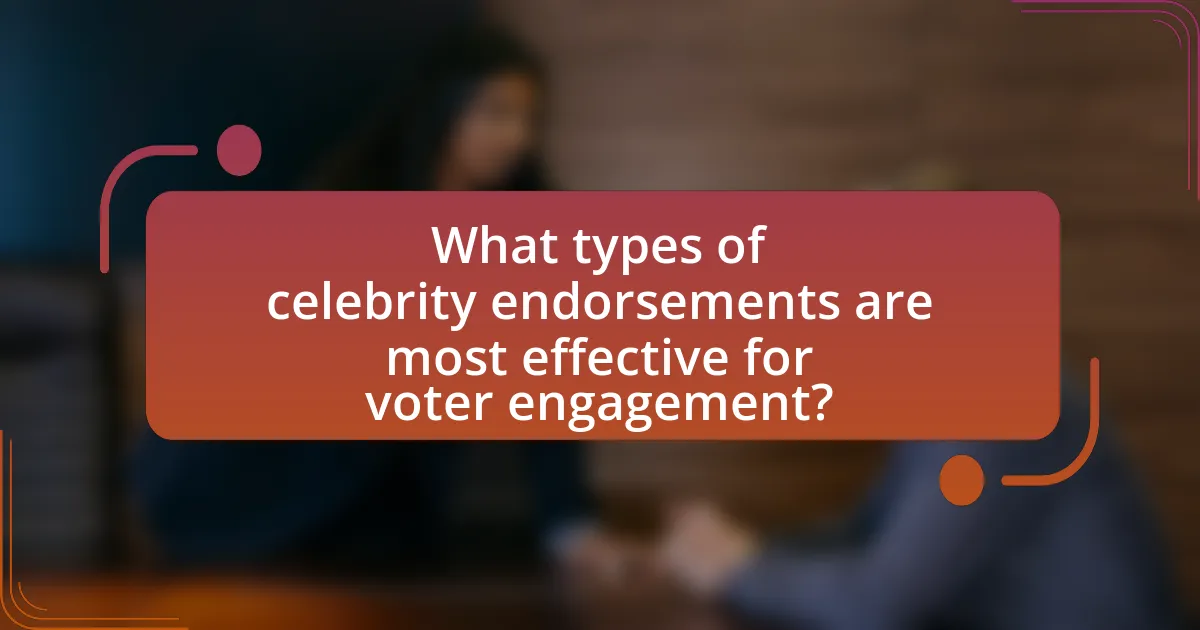
What types of celebrity endorsements are most effective for voter engagement?
Celebrity endorsements that are most effective for voter engagement include those that leverage authenticity, relatability, and social media presence. Research indicates that endorsements from celebrities who are perceived as genuine and share personal stories related to political issues resonate more with voters, increasing their likelihood of participation. For instance, a study by the University of Southern California found that endorsements from celebrities who actively engage with their audience on platforms like Instagram or Twitter can lead to a 20% increase in voter turnout among younger demographics. This effectiveness is further amplified when celebrities align with specific causes, as seen in campaigns like “Rock the Vote,” which utilized various artists to mobilize young voters around critical issues.
How do different types of celebrities influence voter engagement?
Different types of celebrities influence voter engagement through their ability to reach diverse audiences and shape public opinion. For instance, musicians often engage younger voters by using social media platforms to promote voting initiatives, as seen in campaigns like “Rock the Vote,” which reported a significant increase in voter turnout among 18- to 24-year-olds during election cycles. Actors and actresses, particularly those with large followings, can leverage their visibility to raise awareness about specific issues, as demonstrated by Leonardo DiCaprio’s advocacy for climate change, which mobilized discussions around environmental policies during elections. Athletes also play a crucial role; for example, LeBron James’s “More Than a Vote” initiative aimed to combat voter suppression and encouraged participation among African American communities, resulting in increased voter registration and turnout in key demographics. These examples illustrate how different celebrity types can effectively mobilize their fan bases and influence electoral participation.
What is the impact of local versus national celebrities on voter turnout?
Local celebrities generally have a more significant impact on voter turnout than national celebrities. This is primarily because local celebrities are often more relatable to the community, fostering a stronger emotional connection and sense of trust among voters. Research indicates that endorsements from local figures can increase voter participation by as much as 10% in local elections, as seen in studies conducted during municipal elections in various U.S. cities. In contrast, national celebrities may raise awareness but often lack the same level of personal connection, resulting in a less pronounced effect on local voter turnout.
How does the credibility of a celebrity affect their endorsement’s effectiveness?
The credibility of a celebrity significantly enhances the effectiveness of their endorsements. When a celebrity is perceived as trustworthy and authentic, their endorsement can lead to increased consumer trust and a higher likelihood of influencing purchasing decisions. Research indicates that endorsements from credible celebrities can boost brand attitudes by up to 50%, as consumers are more likely to align with the values and messages conveyed by someone they respect and believe in. This correlation is particularly evident in political contexts, where credible endorsements can sway voter opinions and increase engagement, as seen in studies conducted during major elections, which highlight the impact of celebrity influence on voter turnout and preferences.
What strategies can campaigns use to leverage celebrity endorsements?
Campaigns can leverage celebrity endorsements by strategically aligning the celebrity’s image and values with the campaign’s message to enhance credibility and reach. This alignment can increase voter engagement, as studies show that endorsements from well-known figures can significantly influence public perception and behavior. For instance, a 2016 study published in the Journal of Political Marketing found that celebrity endorsements can increase voter turnout by up to 20%, demonstrating their effectiveness in mobilizing support. Additionally, campaigns can utilize social media platforms to amplify the celebrity’s reach, as celebrities often have large followings that can be tapped into for broader audience engagement.
How can campaigns select the right celebrities for their message?
Campaigns can select the right celebrities for their message by aligning the celebrity’s values, audience, and credibility with the campaign’s objectives. Research indicates that when a celebrity’s personal brand resonates with the campaign’s message, it enhances authenticity and relatability, leading to increased voter engagement. For instance, a study published in the Journal of Advertising Research found that endorsements from celebrities who share similar values with the target demographic can boost message acceptance by up to 50%. Therefore, analyzing the celebrity’s public persona, past endorsements, and audience demographics is crucial for effective selection.
What methods can be used to maximize the impact of celebrity endorsements?
To maximize the impact of celebrity endorsements, brands should ensure alignment between the celebrity’s image and the product’s values. This alignment enhances authenticity, which is crucial as studies show that 92% of consumers trust recommendations from individuals over advertisements. Additionally, leveraging social media platforms for endorsements can amplify reach; for instance, a study by Nielsen found that 92% of consumers trust peer recommendations, making social media a powerful tool for engagement. Furthermore, creating interactive campaigns that involve the celebrity can foster deeper connections with the audience, as engagement rates increase when consumers feel part of the narrative.
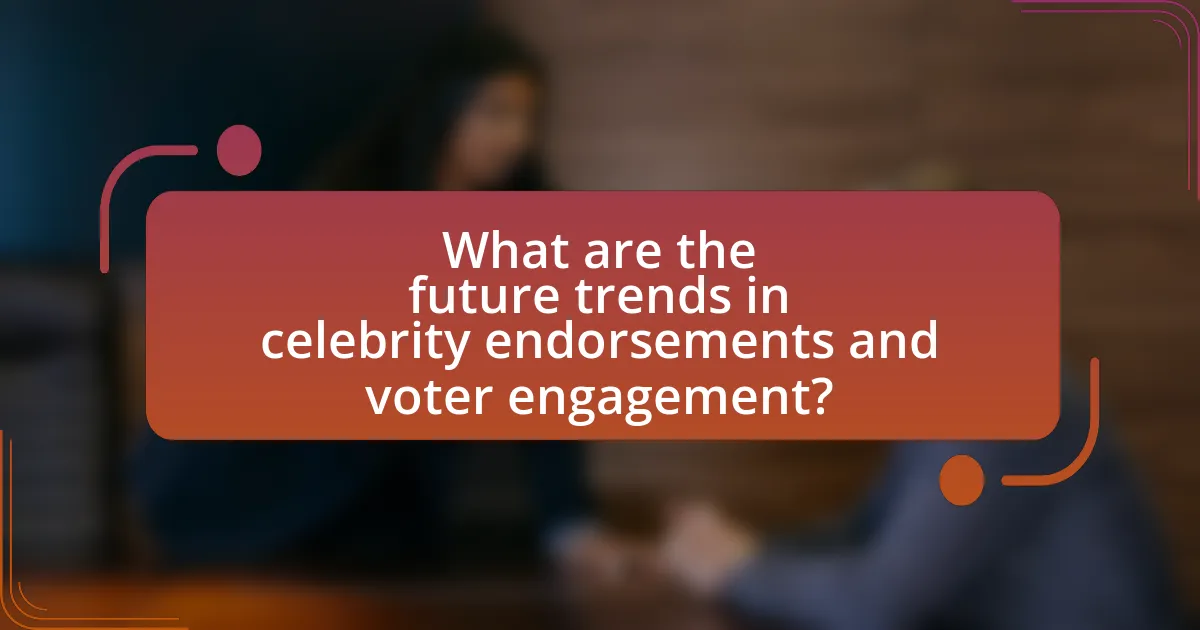
What are the future trends in celebrity endorsements and voter engagement?
Future trends in celebrity endorsements and voter engagement indicate a growing reliance on social media platforms for outreach and influence. As celebrities increasingly utilize platforms like Instagram and TikTok, they can engage younger voters more effectively, as evidenced by the 2020 U.S. election where social media campaigns significantly impacted voter turnout among millennials and Gen Z. Additionally, the trend of authenticity in endorsements is rising; celebrities who align with social causes resonate more with voters, as shown by studies indicating that 70% of young voters prefer candidates endorsed by celebrities who genuinely support their causes. This shift towards digital engagement and authenticity is likely to shape future political campaigns and voter mobilization efforts.
How is social media changing the landscape of celebrity endorsements?
Social media is transforming celebrity endorsements by enabling direct interaction between celebrities and their audiences, which enhances authenticity and engagement. This shift allows celebrities to communicate their endorsements in real-time, fostering a sense of personal connection with followers. For instance, a study by the American Marketing Association found that 70% of consumers are more likely to trust a brand endorsed by a celebrity they follow on social media, highlighting the effectiveness of this medium in shaping consumer perceptions. Additionally, platforms like Instagram and TikTok facilitate targeted marketing, allowing brands to reach specific demographics more efficiently, thus amplifying the impact of celebrity endorsements on voter engagement and consumer behavior.
What role do influencers play in modern political campaigns?
Influencers play a significant role in modern political campaigns by shaping public opinion and increasing voter engagement through their extensive reach on social media platforms. Their ability to connect with specific demographics allows political candidates to target younger voters effectively; for instance, a study by the Pew Research Center found that 71% of young adults aged 18-29 use Instagram, making it a crucial platform for political messaging. Influencers often endorse candidates, share campaign messages, and mobilize their followers to participate in elections, thereby amplifying the campaign’s visibility and impact. This trend has been evident in recent elections, where candidates have leveraged influencer partnerships to enhance their outreach and resonate with the electorate.
How can campaigns adapt to the evolving nature of celebrity influence?
Campaigns can adapt to the evolving nature of celebrity influence by leveraging data analytics to identify which celebrities resonate with target demographics. This approach allows campaigns to select endorsers who align with the values and interests of specific voter groups, thereby enhancing engagement. For instance, a study by the Pew Research Center found that 70% of young voters are influenced by celebrities when making political decisions, indicating the importance of strategic celebrity partnerships. By continuously monitoring social media trends and public sentiment, campaigns can adjust their strategies in real-time, ensuring that their celebrity endorsements remain relevant and impactful.
What best practices should campaigns follow when using celebrity endorsements?
Campaigns should ensure that celebrity endorsements align with their brand values and target audience to maximize effectiveness. This alignment enhances authenticity, as consumers are more likely to trust endorsements that resonate with their beliefs and preferences. Research indicates that 70% of consumers are more likely to trust a brand when a celebrity they admire endorses it, highlighting the importance of selecting a celebrity who genuinely connects with the campaign’s message. Additionally, campaigns should focus on transparency by clearly disclosing the nature of the endorsement, as this builds credibility and trust with the audience. Engaging the celebrity in the campaign’s narrative, rather than using them solely for their image, can also create a more compelling and relatable message, further driving voter engagement.
How can campaigns ensure authenticity in celebrity endorsements?
Campaigns can ensure authenticity in celebrity endorsements by selecting celebrities whose values align closely with the campaign’s message and target audience. This alignment fosters genuine connections, as audiences are more likely to trust endorsements from celebrities who genuinely support the cause. Research indicates that 70% of consumers are more likely to trust a brand when the celebrity endorsing it shares their values (Nielsen, 2016). Additionally, campaigns should encourage celebrities to share personal stories related to the cause, enhancing relatability and credibility. By prioritizing transparency and authenticity, campaigns can effectively leverage celebrity endorsements to engage voters.
What are the key metrics to evaluate the success of celebrity endorsements?
The key metrics to evaluate the success of celebrity endorsements include brand awareness, engagement rates, sales conversions, and social media reach. Brand awareness can be measured through surveys and tracking changes in brand recognition before and after the endorsement. Engagement rates, such as likes, shares, and comments on social media posts featuring the celebrity, indicate how well the endorsement resonates with the audience. Sales conversions can be tracked through sales data during and after the campaign, providing a direct correlation between the endorsement and consumer purchasing behavior. Social media reach quantifies the number of people exposed to the endorsement, often measured through impressions and follower growth. These metrics collectively provide a comprehensive view of the effectiveness of celebrity endorsements in influencing voter engagement and brand perception.
